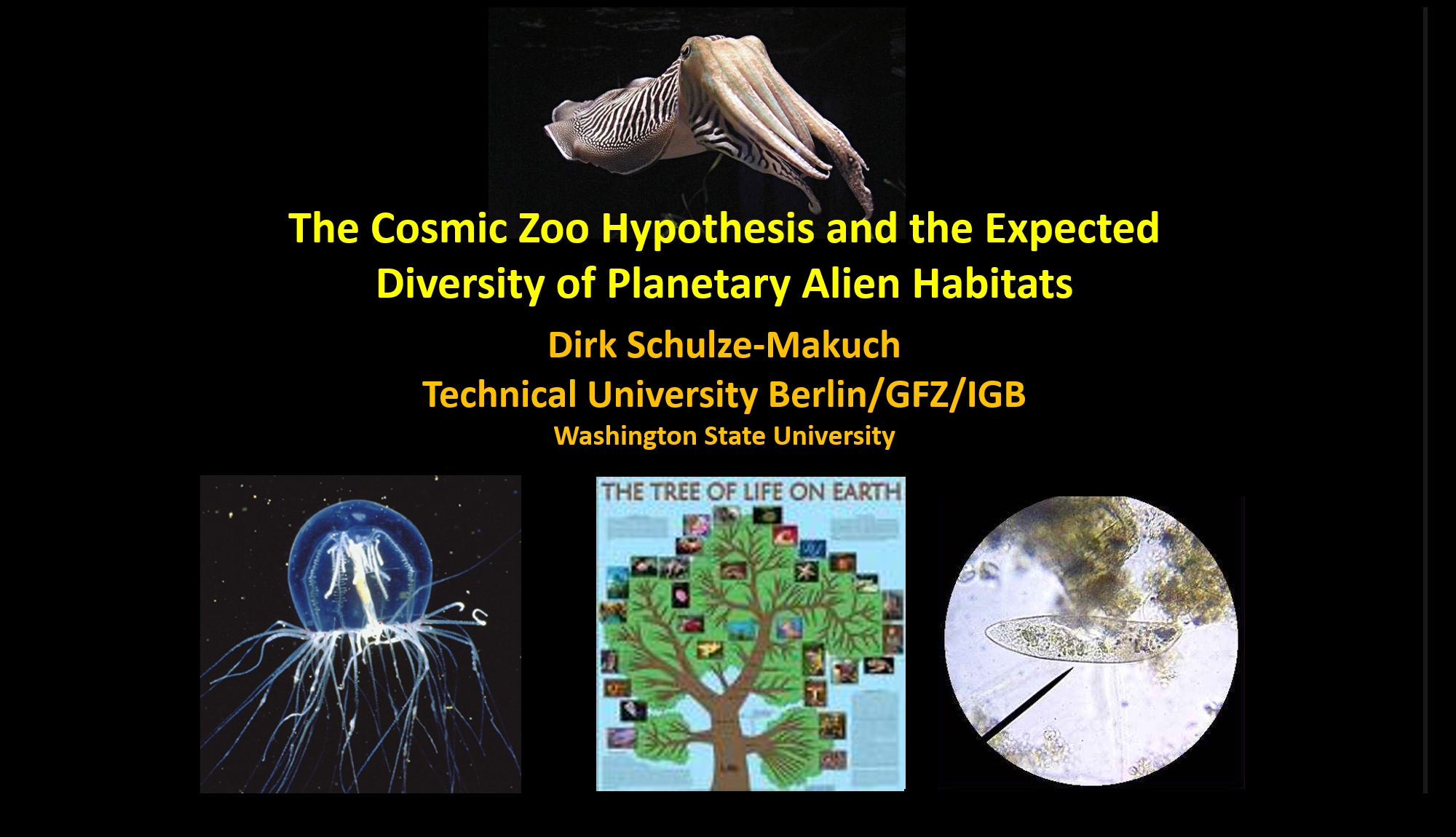
- This event has passed.
The Cosmic Zoo Hypothesis and the Expected Diversity of Planetary Alien Habitats
3 October 2022 @ 9:00 pm - 10:30 pm CEST

The Cosmic Zoo hypothesis states that if life originates on a planetary body it will eventually evolve to become complex, meaning plant- and animal-like, if the planet or moon stays habitable long enough (in general billions of years). Multiple biochemically pathways have been invented through natural selection to arrive at Earth´s biosphere as it is now. If we screen the known planets and moons in our Solar System, and also the thousands of planets outside of our Solar System, we can derive a subset of these planets that could harbor life, some of them life as we don´t know it and a few of them possibly complex life.
A short bio
Dirk Schulze-Makuch received his Ph.D. in geosciences at the University of Wisconsin-Milwaukee. Afterwards he took up a fellowship at the NASA Goddard Space Flight Center, worked as Assistant Professor at the University of Texas at El Paso, and later as Associate and Full Professor at Washington State University. In 2010 he received the Friedrich-Wilhelm Bessel Award from the Humboldt Foundation for extraordinary achievements in theoretical biology. Since 2013 he is a faculty member at the Technical University Berlin in Germany and holds a professorship for planetary habitability and astrobiology, leading the Astrobiology Research Group. He still is Adjunct Professor at Washington State University and also an Associate Member of SETI. Dirk published more than 200 papers and 8 books in the field of planetary habitability and astrobiology, including the 3rd edition of Life in the Universe: Expectations and Constraints and The Cosmic Zoo: Complex Life on Many Worlds, first published in 2017. Since 2016 Dirk is president of the German Astrobiological Society and council member of the European Astrobiology Network. He gave interviews in scientific television documentaries such as National Geographic and Discovery Channel (USA), NHK-TV (Japan), ARD and RTL (Germany), and reports about his research appeared in media and news outlets such as Science, Popular Science, Discovery Magazine, New Scientist, World Science, Natural History Magazine, BBC, CNN, MSNBC, etc.
More information can be found on his website https://www.searchforlifeintheuniverse.com/
Dirk Schulze-Makuch received his Ph.D. in geosciences at the University of Wisconsin-Milwaukee. Afterwards he took up a fellowship at the NASA Goddard Space Flight Center, worked as Assistant Professor at the University of Texas at El Paso, and later as Associate and Full Professor at Washington State University. In 2010 he received the Friedrich-Wilhelm Bessel Award from the Humboldt Foundation for extraordinary achievements in theoretical biology. Since 2013 he is a faculty member at the Technical University Berlin in Germany and holds a professorship for planetary habitability and astrobiology, leading the Astrobiology Research Group. He still is Adjunct Professor at Washington State University and also an Associate Member of SETI. Dirk published more than 200 papers and 8 books in the field of planetary habitability and astrobiology, including the 3rd edition of Life in the Universe: Expectations and Constraints and The Cosmic Zoo: Complex Life on Many Worlds, first published in 2017. Since 2016 Dirk is president of the German Astrobiological Society and council member of the European Astrobiology Network. He gave interviews in scientific television documentaries such as National Geographic and Discovery Channel (USA), NHK-TV (Japan), ARD and RTL (Germany), and reports about his research appeared in media and news outlets such as Science, Popular Science, Discovery Magazine, New Scientist, World Science, Natural History Magazine, BBC, CNN, MSNBC, etc.
More information can be found on his website https://www.searchforlifeintheuniverse.com/
Click ‘going’ to the Facebook event: https://www.facebook.com/events/1276600586213700/
Follow the livestream on the Space Renaissance Youtube channel: https://youtu.be/4J37eAkELmM
Follow the livestream on the Space Renaissance Youtube channel: https://youtu.be/4J37eAkELmM